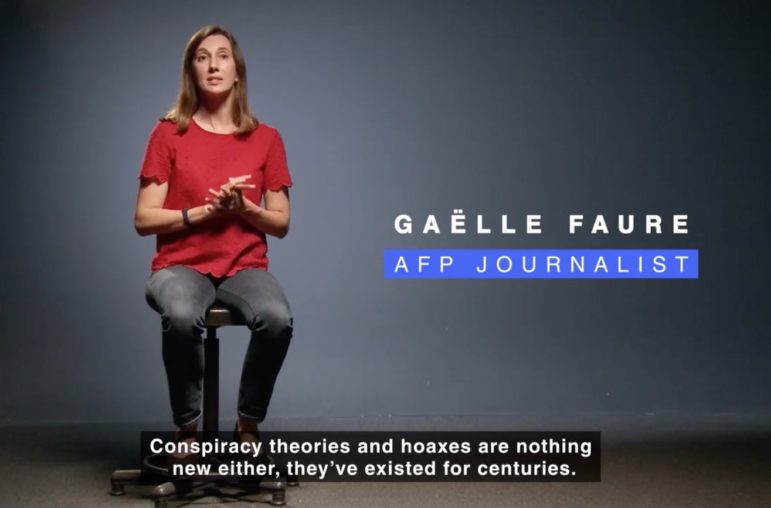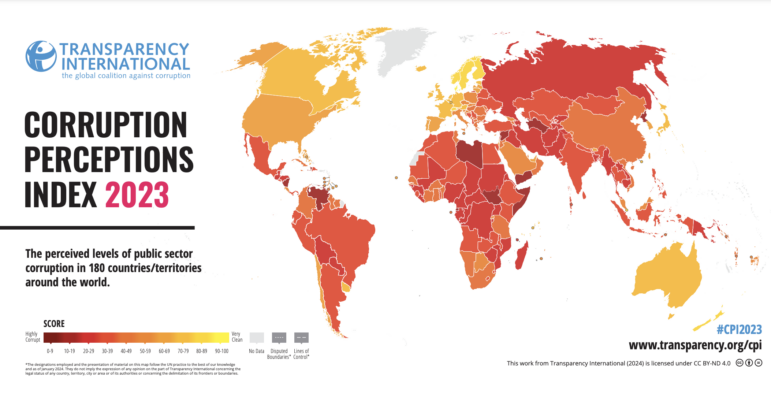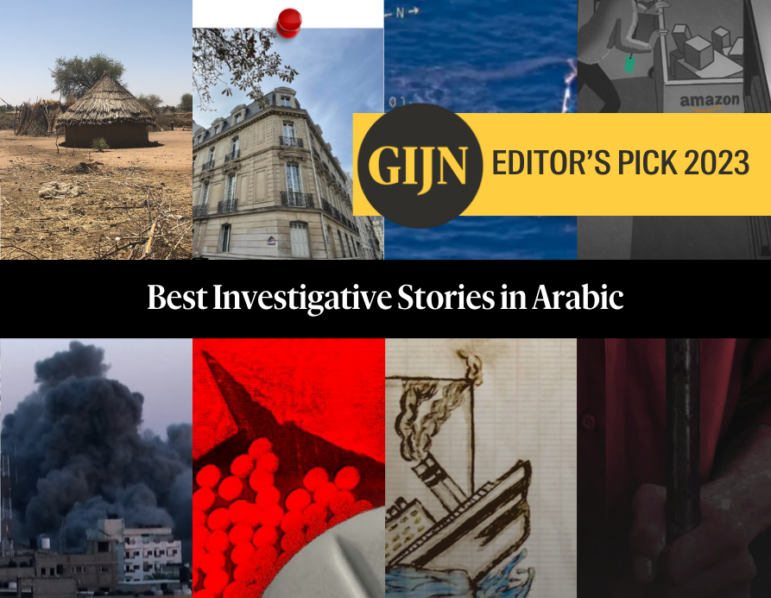

Editor’s Pick: Best Investigative Stories from the Former Soviet Union 2017
Read this article in
 It’s been a year since GIJN launched its Russian-language social media with Facebook and Twitter and while we’ve been growing followers, as well as our Russian-language resources, we’ve also been closely watching the stream of investigations by our colleagues throughout the region. Despite the challenges faced by independent journalists in the region — physical threats, legal harassment, intimidation and lack of resources — we think you’ll agree that these reporters continue to do world-class investigations into organized crime, corruption and other abuses of power.
It’s been a year since GIJN launched its Russian-language social media with Facebook and Twitter and while we’ve been growing followers, as well as our Russian-language resources, we’ve also been closely watching the stream of investigations by our colleagues throughout the region. Despite the challenges faced by independent journalists in the region — physical threats, legal harassment, intimidation and lack of resources — we think you’ll agree that these reporters continue to do world-class investigations into organized crime, corruption and other abuses of power.
We’ve rounded-up some of the most interesting investigative stories of 2017 — courageous reports which uncovered crucial facts, displayed innovative investigative methods and won international and regional awards. And so, in no particular order, as each of these deserve special attention, here are our top picks from GIJN’s Russian language editor, Olga Simanovych.
Propaganda Factories
GIJN member Re:Baltica conducted a series of investigations in 2017 which consistently exposed fake news stories, propaganda factories, pseudo-information portals propelled by social networks and pro-Kremlin publications working in the Baltic countries over the past year.
Journalists revealed how some Baltic media houses, which are owned by a Russian holding company, were re-publishing different versions of pro-Kremlin stories on marginal news portals and promoting those stories using fake profiles — also known as trolls — on social networks in a massive disinformation campaign. The various versions of the same story ended up confusing readers, making it increasingly difficult to find accurate information in the region.
Journalists Inga Springe and Sanita Emberge combed through mounds of data, uncovering the network connected with the Kremlin propaganda group Rossiya Segodnya. They discovered that the misinformation was not only shared through the pseudo-news sites, but through provocative books by pro-Russian political scientists as well as online educational centers offering journalism training for young people from Germany, Russia, Poland and the Baltic countries.
Monastery Billions
An investigation by Gleb Yarovoi in the online media Horizontal Russia 7х7 on the economic miracle of the Valaam Monastery delved into what is known in the region as the “Valaam conflict.” For the last ten years, the monastery has been displacing locals from the island — which is located in the northern portion of Lake Ladoga, on the outskirts of Saint Petersburg — to the mainland, in what appeared to be an effort by the monastery to become the sole occupier of the island.
Over the years, journalists had attempted to uncover why the state invested so much money in development of the monastery, wondering whether state financial support was the real reason for the monastery’s desire to reign supreme on Valaam. But it wasn’t until 7×7’s Yarovoi collected documents which showed financial flows to the island that journalists were able to follow the money back to state coffers.
Russian Laundromat: The Sequel
The ”Russian Laundromat” was the name given by the Organized Crime and Corruption Reporting Project (OCCRP) to a vast money-laundering scheme which 60 journalists from 32 countries uncovered in a series of stories.
In 2014, the investigation uncovered $22 billion (about 700 billion rubles) which flowed out of Russia between 2011 to 2014 and was laundered through the Republic of Moldova through a complicated financial scheme involving bribery and the exploitation of the Moldovan legal system. According to OCCRP, money entered the “laundromat” through untraceable shell companies in Russia with some of the funds being “diverted from the Russian treasury through fraud, rigging of state contracts, or customs and tax evasion.”
Between 2014 and 2017, journalists from OCCRP, Russia’s Novaya Gazeta, Rise Moldova, The Guardian, Sueddeutsche Zeitung and others analyzed 76,000 banking transactions, amounting to $156 billion. This time they found that the money which flowed out of Russia was received by 5,140 different companies in 732 banks in 96 different countries from the US and South Africa to China and Australia. The Russian money, which appeared to come from some of the largest state contracts which might have helped repair the country’s deteriorating roads and ports, modernize the healthcare system or ease the poverty of senior citizens, was actually used for luxuries, including paying for rock bands touring Russia and a small Polish NGO that pushed Russia’s agenda in the European Union.
Russia’s US Election Troll Factory
An investigation by Russian newspaper RBC offered the first detailed look at a troll organization’s activity during the 2016 US election period.
RBC journalist Andrei Zakharov and colleague Polina Rusyaeva initially revealed that the Russian “troll factory” and a new media holding with a monthly audience of more than 36 million not only had common managers and, very likely, the same investor, but also a common “den” in house No. 55 on Savushkina Street in Saint Petersburg.
Continuing the investigation, the RBC story (which was covered by by The Guardian) identified 118 accounts or groups on Facebook, Instagram and Twitter which were linked to the troll factory, all of which had been blocked in August and September 2017 as part of the US investigation into Russian electoral meddling.
The scale of this activity was impressive: the total number of followers were 6 million people. And, thanks to advertising and distribution of content through social media platforms, the organization could have reached between 20 and 30 million people each week. But their influence went beyond the virtual and into real space.
Between 2016 and 2017, some 40 different US rallies and protests were held after being promoted by the troll factory. Perhaps the most disturbing claim was that employees of the troll factory contacted about 100 US-based activists offering to help with the organization of protests and events. RBC said the activists were contacted by Facebook group administrators hiding their Russian origins who said they could pay for transport or printing costs. About $80,000 was spent during a two-year period, according to the report.
“The task wasn’t to support Trump,” one of the factory’s employees told RBC. “We raised social issues and other problems that already existed in the US, and tried to shine as bright a light as possible on them.” The employee said that because presidential candidate Hilary Clinton was part of the current government, she was also a target.
Murder of Honor

Chechnya’s Gay Purge: The article that caused religious leaders to call for a jihad against Novaya Gazeta. Screenshot
Novaya Gazeta’s investigation — Murder of Honor — about mass persecutions and killings of gay men in Chechnya probably qualifies as the most daring and shocking story of the year. Journalists at the publication discovered evidence that gay men were being detained, tortured and even killed in an anti-homosexual purge in Chechnya. After the story ran alongside a piece on surviving witnesses, religious leaders in the Russian republic of Chechnya called for the “massacre” of journalists, with 15,000 people gathering in the main mosque of Chechnya to announce a jihad against the staff of Novaya Gazeta. Shortly after a statement was released by the publication asking for government protection from the jihad, Novaya Gazeta’s website went down in a suspected distributed denial-of-service attack.
Newspapers around the world picked up the story, including The Washington Post. While international human rights organizations pushed for an investigation into the extrajudicial killings, no criminal proceedings were initiated.
In July, Novaya Gazeta published the names of 27 people executed in Grozny without trial and indictment and presented evidence that Chechen authorities were trying to hide traces of the executions.
For her series of investigations, Elena Milashina received the International Press Freedom Award, the Human Rights and the Rule of Law medal, the Louis M. Lyons Award for Conscience and Integrity in Journalism and the A Sakharov’s Award Journalism as a Deed.
Killing Pavel
For years, Belarusian journalist Pavel Sheremet’s reporting challenged authorities from Minsk to Moscow. Then, in July 2016, he was killed by a car bomb in the Ukrainian capital of Kiev.
While Ukraine President Petro Poroshenko called for law enforcement to find and punish those behind the attack, authorities have so far been unable to solve the case.
But journalists from GIJN member organizations Slidstvo.Info and OCCRP — Anna Babinets, Olena Loginova, Dmitro Gnap, and Vlad Lavrov — weren’t going to let the death go uninvestigated. They arrived on the scene of the crime not long after the attack and began a nine-month investigation. That research resulted in the documentary film, Killing Pavel.
Collecting video footage from surveillance cameras in the area near the incident, they carefully analyzed the night of the murder. The team found at least six witnesses who were not interrogated by police. With the help of experts from Bellingcat, they also tracked down a car belonging to former (or current) Russian intelligence officer Igor Ustimenko, who was also not interrogated by an official investigation.
After the documentary was shown, Ustimenko was finally interrogated by police, and the journalists were brought in as witnesses. Despite the progress, it’s impossible to know which way the official investigation is heading; police are keeping all court decisions secret in order, they say, to protect the lives of those “who participate in criminal proceedings.”
Wagner’s List
In response to the August statement from Russia’s ministry of defense that the presence of Russian “military volunteers” in Syria was a myth and information about their death a mockery, Russia’s Fontanka.ru published an investigation of the deaths of the Russian soldiers who didn’t make it into official statistics.
In Denis Korotkov’s investigation Wagner’s List, he discovered the lives lost in Syria were actually mercenaries from a Russian paramilitary organization, the Wagner Group.
According to his report, during the operation to liberate Palmyra in April and May 2016, approximately 32 fighters of the group were killed, while about 80 soldiers were seriously injured. From the beginning of 2017, an additional 40 to 60 mercenary soldiers were killed and 80 to 180 people were injured. Korotkov’s investigation also uncovered evidence which showed that, since the end of 2015, the private battalion group, which is part of Russian businessman Yevgeny Prigozhin’s empire, had been in Syria, and that the soldiers were trained on Defense Ministry property in the Krasnodar Region.
After the report was published, Fontanka.ru and Korotkov were threatened and a series of articles alleged connections between the reporter and terrorists. Korotkov was one of the finalists of the A Sakharov Award Journalism as a Deed and received an independent professional award, the Editorial Board prize.
Azerbaijani Laundromat

Washed Up II: The collaborative investigation exposed how Azerbaijan’s kleptocratic ruling clique uses some of its billions. Screenshot
The Azerbaijani Laundromat is a complex money-laundering operation and slush fund that handled $2.9 billion over a two-year period through four shell companies registered in the UK.
From 2012 to 2014, as the Azerbaijani government arrested activists and journalists (such as Radio Freedom journalist Khadija Ismayilova), members of the country’s ruling elite were using a secret slush fund to pay off European politicians, buy luxury goods and launder money. Banking records revealing some US2.9 billion (2.5 billion euro) in transactions were initally leaked to the Danish newspaper Berlingske, which shared them with OCCRP. The two outlets then organized a collaborative investigation to track down where the money went.
The result was dubbed the Azerbaijani Laundromat because the vast sums that passed through it were laundered through a series of shell companies that disguised their origin. The project revealed how the country’s kleptocratic ruling clique uses some of its billions.
At least three European politicians, a journalist friendly to the regime and businessmen who praised the government were among the recipients of Azerbaijani Laundromat money. In some cases, these prominent individuals were able to mobilize important international organizations, such as UNESCO and the Parliamentary Assembly of the Council of Europe, to score PR victories for the regime.
The scheme was uncovered through a joint investigation by Berlingske (Denmark), OCCRP, The Guardian (UK), Süddeutsche Zeitung (Germany), Le Monde (France), Tages-Anzeiger and Tribune de Genève (Switzerland), De Tijd (Belgium), Dossier (Austria), Atlatszo.hu(Hungary), Delo (Slovenia), RISE Project (Romania), Bivol (Bulgaria), Aripaev (Estonia), Czech Center for Investigative Journalism (Czech Republic), Novaya Gazeta (Russia) and Barron’s (US).
Samaragate
The editorial team of Kyrgyzstan’s Kloop.kg and Swedish digital criminologists from Qurium found evidence that a state server was hosting a website called samara.kg during the country’s 2017 presidential elections.

Hooked Up: State servers in Kyrgyzstan hosted a website used for obtaining data on the electorate. Screenshot from Kloop.kg
Just two days before the election, an anonymous hacktivist broke into the site — which had previously supported a real estate agency — and told journalists that samara.kg was a system for managing the dirty tricks campaign of pro-government candidate Sooronbai Jeenbekov.
Many observers of the last presidential election in Kyrgyzstan have alluded to this hidden campaign resource, which targeted state employees to vote for pro-government candidates.
To manage all this, they needed an online system to report on agitation, intimidation and bribery and to verify voter registration — which is exactly what Samara did.
Kloop.kg and Qurium dug in, discovering that the website had become a data management system for personal information on citizens of Kyrgyzstan. The site was hosted on the State Registration Service server from September 13 to October 13. The team obtained testimonies from those working in the election headquarters of candidate Sooranbay Zheenbekov, who confirmed that “Samara” was used for obtaining data on the election and controlling votes. Zheenbekov won the election with more than 54 percent of the votes.
While authorities continue to deny that samara.kg was kept on a government server, the digital tracks seem to illustrate that they are either lying or they don’t know what’s happening on their own servers.
Getting the Goods: From Moldova to the Crimea
One of the most popular stories on GIJN’s social media pages this year came from a story by journalists from Rise Moldova, kloop.kg and Texty.org.ua. The reporters investigated imports into the Crimea which were bypassing sanctions.
Because of the annexation of Crimea by Russia in 2014 and trade wars between Moscow and Kiev, exporters sending goods from Moldova to the Crimea have suffered. The trade route for Moldovan goods to the peninsula has doubled, and to circumvent the prohibitions on trade with the Crimea, entrepreneurs have been forced to use the services of Russian intermediary firms. The journalists sent inquiries to the Ministry of Foreign Affairs, but by the end of January 2018, no response had been received and the import of Moldovan goods to the peninsula continues.
Ukrainian Oligarchs Face Off Abroad

Face Off: With the help of the Paradise Papers, journalists revealed a secret settlement between Ukrainian oligarchs. Screenshot
The British press was enthralled for months with a financial dispute among Ukrainian oligarchs which was said to be worth billions. Ukrainian businessman Viktor Pinchuk, who is married to the daughter of former Ukrainian President Leonid Kuchma, demanded from two other Ukrainian oligarchs — Ihor Kolomoyskyi and Henadiy Boholyubov — $1.5 billion at the London High Court in 2013.
Pinchuk allegedly gave money to Kolomoyskyi and Boholyubov in the middle of the 2000s with the aim of purchasing one of the biggest iron ore mining enterprises in Ukraine, the Kryvyi Rih Iron Ore Plant. He says he lost $2 billion and didn’t get the company — or his money — back. In January 2016 the matter was settled out of court.
But the mystery of the settlement was revealed by OCCRP and Slidstvo.Info with the help of documents from the Paradise Papers: Pinchuk ended up with the two most expensive commercial buildings in the center of London.
Following the coverage of scandal, journalists recalled a long and dark history of violations during the privatization of Ukrainian industrial enterprises and showed that workers at the plant — which was sold for a pittance — now receive scanty salaries and work in dangerous conditions.
Professor of Harassment
In November, Ukraine’s Fourth Estate published the investigation “With Word, With Body,” which uncovered the abuse of female students, as well as their mothers and teachers, by Volodymyr Godovski, the chair of choreography at Rivne State Humanitarian University. After the initial story came out, Ukrainian media followed it up and the professor eventually quit his job and the police opened an investigation into the alleged abuse.
This is part of a GIJN series on the best regional investigative journalism. Check out our round-ups from Arabic-speaking countries, China and Latin America.
 Olga Simanovych is GIJN’s Russian-language editor. She has worked as a screenwriter, media trainer, managing editor, TV news reporter for Vikna-Novyny on STB and has participated in SCOOP‘s international investigations. She is fluent in Ukrainian, Russian, English and Greek.
Olga Simanovych is GIJN’s Russian-language editor. She has worked as a screenwriter, media trainer, managing editor, TV news reporter for Vikna-Novyny on STB and has participated in SCOOP‘s international investigations. She is fluent in Ukrainian, Russian, English and Greek.
















